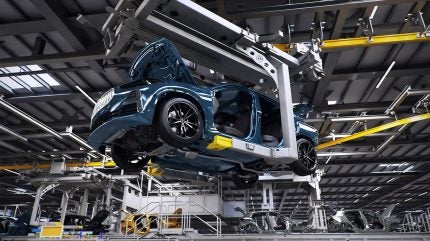
The BMW Group is advancing its Virtual Factory initiative, with production planners enhancing applications across digital twins of over 30 production facilities to streamline global production planning.
The company reports that processes which previously took several weeks for real-world adjustments and testing can now be accurately simulated within the Virtual Factory framework.

Discover B2B Marketing That Performs
Combine business intelligence and editorial excellence to reach engaged professionals across 36 leading media platforms.
To prepare for upcoming vehicle launches, the BMW Group plans to integrate more than 40 new or updated models into its global production network by 2027, starting with virtual simulations to ensure stability at the manufacturing sites.
The implementation of the Virtual Factory is expected to lead to a reduction in production planning costs by as much as 30%.
Virtual planning is integral to the BMW Group’s iFACTORY strategy, employing a variety of tools that connect building, equipment, logistics, and vehicle data, alongside 3D simulations of manual processes.
This integration is said to create digital twins for all BMW Group plants globally.
Using an industrial 3D metaverse application developed on Nvidia Omniverse, real-time simulations facilitate the virtual optimisation of layouts, robotics, and logistics systems.
The Virtual Factory is continuously evolving, incorporating generative and agentic AI capabilities, stated the company.
For each new product launch, it is critical to ensure compatibility with the production line and to prevent any potential collisions. Within the Virtual Factory, this verification process is automated, utilising construction data and 3D scans.
The simulation of vehicle movement and rotation through production lines allows for automatic collision checks, reducing the time required for this process from nearly four weeks to just three days.
Previously, identifying potential collisions necessitated the manual guidance of a physical vehicle body through production lines, often requiring extensive weekend work.
In the paint shop, this process sometimes involved emptying and cleaning dip coating tanks, resulting in significant costs and time commitments.
The BMW Group’s Virtual Factory is rapidly expanding its capabilities, which now include automated collision checks, human simulations for optimising manual tasks, and automated mapping of surroundings from existing 3D scans to enhance smart transport systems.
Last month, the BMW Group announced that it is enhancing its exploration of all-solid-state battery (ASSB) technology by incorporating large-format ASSB cells from Solid Power into its test vehicle, the BMW i7, which is currently being tested in the Munich area.






